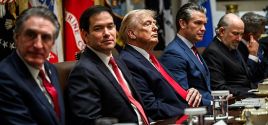What Better Time than Now to End the Drug War?by Jacob G. HornbergerJun. 09, 2011 |
Popular 
Carrie Boller Kicked Off Religious Liberty Commission After Defending Christians' Religious Liberties

Carrie Prejean Boller Takes on the Zionist Lobby at White House Religious Liberty Commission

Trump Expected to Pick Kevin Warsh, Son-in-Law of Zionist Billionaire Ron Lauder, as Fed Chair

Trump Appears Poised to Abandon 'Mass Deportations'

Video Appears to Show Alex Pretti Spit at ICE, Kick Taillight Out of ICE Vehicle in Prior Confrontation
 The Pentagon and the military-industrial complex and other drug-war proponents must be reeling over recent reports on the federal fiasco known as the drug war. Two of the reports were issued by the U.S. government itself. According to the Los Angeles Times, those two reports show that “as drug cartels wreak murderous havoc from Mexico to Panama, the Obama administration is unable to show that the billions of dollars spent in the war on drugs have significantly stemmed the flow of illegal narcotics into the United States.” The other report was issued by the Global Commission on Drug Policy, which consisted of former U.S. Secretary of State George Shultz, former Federal Reserve Board Chairman Paul Volker, former president of Mexico Ernesto Zedillo, former UN Secretary Kofi Anan, and others. That report concluded: Political leaders and public figures should have the courage to articulate publicly what many of them acknowledge privately: that the evidence overwhelmingly demonstrates that repressive strategies will not solve the drug problem, and that the war on drugs has not, and cannot, be won.This sure sounds like a no-brainer to me. After all, the U.S. government is up against its debt ceiling. Its spending far exceeds its tax revenues. It needs to slash spending. So, why not simply abolish the drug war, immediately? Not only would drug legalization save the government (i.e., the taxpayers) billions of dollars, it would also put all the drug cartels and drug gangs out of business, immediately. It would also mean no more drug-war death and destruction, such as the 40,000 dead people in Mexico in the past 5 years alone. It would mean no more drug-war corruption (i.e., bribery) with judges, prosecutors, and law-enforcement personnel. Forty years of failure, death, and destruction. Who could possibly advocate that the drug war be continued, especially with financial bankruptcy looming on the horizon due to out-of-control federal spending? The Pentagon, that’s who. And contractors in the military-industrial complex too. They are among the drug-war’s biggest cheerleaders. Why? Money. Big money. According to the Times, in the past 5 years, U.S. contractors have been paid more than $3 billion to help train Latin American prosecutors and police to fight the drug war. The article states, “The majority of U.S. counter-narcotics contracts are awarded to five companies: DynCorp, Lockheed Martin, Raytheon, ITT and ARINC.” In a time of ever-growing federal expenditures and a debt ceiling that was approaching, “Counter-narcotics contract spending increased 32% over the five-year period, from $482 million in 2005 to $635 million in 2009. DynCorp, based in Falls Church, Va., received the largest total, $1.1 billion.” Moreover, “The Department of Defense has spent $6.1 billion since 2005 to help detect planes and boats heading to the U.S. with drug payloads, as well as on surveillance and other intelligence operations.” Unfortunately, despite 40 years of failure and with financial bankruptcy on the horizon, many drug warriors just won’t let go. According to the Times article, Vanda Felbab-Brown of the Brookings Institute says the solution is to have the military, rather than private contractors, train foreign armies and police. James Gregory, a Pentagon spokesman, says the Defense Department’s drug war efforts “have been the most successful and cost-effective programs” in decades. You might be tempted to ask, “What are these people smoking?” After all, look at what Mexican military involvement in the drug war has wrought in that country — 40,000 deaths in the last five years. But there’s another thing to consider. The Posse Comitatus law prohibits the U.S. military from engaging in law-enforcement operations here in the United States. That law reflects a judgment of the American people that having the military enforce domestic law is a bad idea. We want the police, not the troops, to be enforcing criminal law. Such being the case, then why are we sending the military into Latin America to do what is considered a bad thing here for Americans? If it’s bad for Americans, then it’s equally bad for Latin Americans. The U.S. military has no more business enforcing the drug war in foreign countries than it does enforcing the drug war here within the United States. Forty years ago, drug warriors could argue that victory in the drug war was just a few years away or even right around the corner. Today, that argument is just plain hogwash. If they’ve haven’t won the drug war after 40 years of vicious failure, another five years of death, destruction, and corruption aren’t going to make any difference whatsoever. The only thing more drug warfare will do is enrich the coffers of the military, the military industrial complex, the judges, prosecutors, cops, and drug lords, while accelerating the federal government’s move toward bankruptcy. What better time to end the drug-war fiasco than now? __ Jacob Hornberger is founder and president of the Future of Freedom Foundation. |



